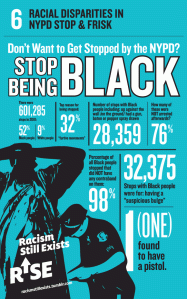Although public commentary describes the United States as “post-racial”, racism continues to exert a very real and pervasive influence on institutional policies and processes, interpersonal interactions, neighborhood infrastructure, socioeconomic opportunities, media imagery, and more. RISE is a project designed to illuminate some of the ways in which racism operates in this country.
That’s how the RISE website begins. From there it cites the statistics about how blacks and Latinos are stopped by police offers more often than whites. To continue:
If in fact “White people don’t complain”, it is because with regard to stop and frisk, White people have little to complain about. The frequent experience of being surveilled, stopped, and searched by the police—and the feelings of humiliation and dehumanization that accompany those stops—belongs primarily to Black and Latino New Yorkers.
It turns out that the NYPD can frisk only when the officer suspects the person has a weapon. Black and Latino people (58%) were more likely to be frisked than White people (44%)—but less likely to be found with a weapon.
New York is not Princeton. The NYPD is not the Princeton police department. But the article reminds us that — in any community, even ours, “driving while black” or “walking while black” can be the “crime” that precipitates a stop.
